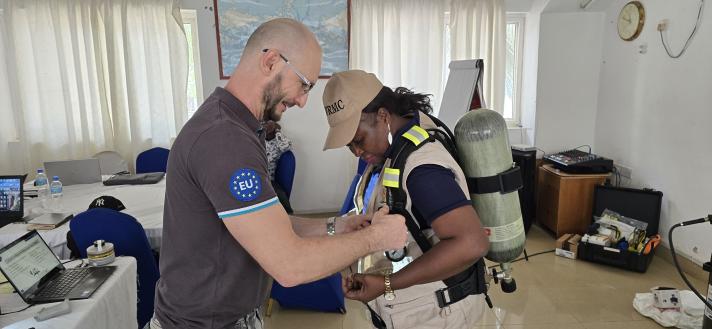
In an era of evolving chemical, biological, radiological and nuclear (CBRN) threats, strengthening interagency readiness and operational coordination is crucial for countries around the world. These threats — whether natural, accidental or deliberate — can have devastating consequences for public health, safety and stability if response mechanisms are not in place.
Recognising the importance of proactive capacity-building, Sierra Leone and Liberia have recently taken steps to enhance their CBRN preparedness. With support from the European Union, both countries hosted comprehensive trainings in February 2025 aimed at strengthening technical and operational capabilities in the detection and response to CBRN risks. The activities focused on fostering interagency collaboration and ensuring that local responders can effectively operate critical CBRN equipment.
From needs assessment to tailored exercises
Each country’s engagement began with a dedicated needs assessment, bringing together project experts and local response agencies to evaluate existing protocols, equipment availability, and coordination mechanisms. This dialogue helped identify specific challenges and guided the design of subsequent training sessions to reflect the realities of each national context.
A table-top exercise followed, allowing participants to simulate decision-making in complex CBRN scenarios and review relevant procedures.
“Starting by discussing with project beneficiaries is key to understanding local needs and ensuring our trainings have a relevant, long-lasting impact,” noted Marian Kolencik, Project Key Expert at ISEM Institut.
Equipment training and real-life drills
The programmes culminated in equipment training sessions and live drills, providing participants with hands-on experience in managing realistic CBRN incidents. These simulations reinforced interagency coordination, highlighted the importance of routine practice, and ensured that equipment — often used infrequently — remains functional and fit for purpose.
Such exercises are particularly valuable in contexts where opportunities for large-scale simulations are limited. They help build confidence among responders and identify operational gaps that could influence the outcome of real emergencies.
Discover the training photo gallery
Outcomes and impact
The initiative delivered significant benefits to CBRN response forces in both countries. In addition to individual skills development, the trainings strengthened interagency coordination and uncovered areas for future improvement. Local authorities in Sierra Leone and Liberia praised the programme, highlighting both the quality of technical support and the relevance of the tailored approach.
Discover the training photo gallery
TEST: improving CBRN threats readiness on a global scale
The capacity building programme in Sierra Leone and Liberia was supported through the EU CBRN CoE Project 106 - CBRN Table top and field Exercises, Simulations, Training (TEST) to mitigate risks.
Established in the context of the EU CBRN CoE Initiative, the three and a half years project (May 2024 – November 2027) collaborates with the 63 partner countries of the CBRN CoE Network - from 8 regions across Africa, Europe and Asia - with the aim of improving preparedness, detection of, response and mitigation against risks related to CBRN materials, and to enhance cooperation among CBRN stakeholders.
TEST builds on the successes of the EU CBRN CoE by strengthening the skills acquired in previous CoE projects and by enhancing the participants’ knowledge via different types of capacity-building activities. The project has an on-demand format in which partner countries request assistance based on the needs identified by the project team through a bottom-up analysis.
Funded by the European Union, the project is implemented by GOPA PACE (Consortium lead), together with ISEM Institute (Technical co-lead), GOPA Worldwide, the Belgian National Crisis Center and the University of Łódź (Consortium Partners).
To learn more about the EU CBRN CoE support to CBRN risk mitigation in Southeast Asia, visit the Regional Secretariat page
Details
- Publication date
- 13 May 2025
- Authors
- Service for Foreign Policy Instruments | Joint Research Centre
- CBRN areas
- Bio-safety/bio-security
- Crisis management
- First response
- Post incident recovery
- Public and infrastructure protection
- Public health impact mitigation
- Safety and security
- CBRN categories
- Chemical
- Biological
- Radiological
- Nuclear
- CoE Region
- AAF - African Atlantic Façade


